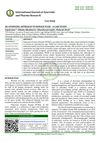 January 2018 in “Journal of Cosmetics, Dermatological Sciences and Applications”
January 2018 in “Journal of Cosmetics, Dermatological Sciences and Applications” Hair transplant surgery can successfully treat hair loss at the back of the neck.
1 citations,
March 2012 in “Journal of pediatric & adolescent gynecology” A young girl with high testosterone was thought to have a tumor but actually had PCOS, which was treated with birth control pills.
 45 citations,
January 1998 in “Dermatology”
45 citations,
January 1998 in “Dermatology” Some skin conditions look like acne but are caused by drugs, and they usually get better when the drug is stopped.
[object Object] 8 citations,
September 2005 in “Practical diabetes” PCOS is a condition causing irregular periods, excess male hormones, and infertility, often managed by targeting insulin resistance and specific symptoms.
 49 citations,
January 1994 in “The Journal of Steroid Biochemistry and Molecular Biology”
49 citations,
January 1994 in “The Journal of Steroid Biochemistry and Molecular Biology” RU 58841 may treat acne, hair loss, and excessive hair growth.
 10 citations,
April 2018 in “Maturitas”
10 citations,
April 2018 in “Maturitas” Excess male hormones in postmenopausal women can cause health issues and increase the risk of heart disease and diabetes; treatment depends on the cause.
 4 citations,
February 2019 in “Biological Trace Element Research”
4 citations,
February 2019 in “Biological Trace Element Research” Chromium salts may help with insulin sensitivity in PCOS, but more research is needed to confirm their overall effectiveness and safety.
 9 citations,
November 2013 in “Presse Medicale”
9 citations,
November 2013 in “Presse Medicale” The document concludes that managing female hyperandrogenism requires a combination of identifying the cause, lifestyle changes, medication, and cosmetic treatments.
 May 2020 in “Hair transplant forum international”
May 2020 in “Hair transplant forum international” Younger people and those with existing acne are more likely to get folliculitis after hair restoration surgery, but it doesn't affect the overall good hair growth result.
 2 citations,
September 2009 in “Nurse Prescribing”
2 citations,
September 2009 in “Nurse Prescribing” PCOS affects many women, causing various symptoms and health risks, and is managed through lifestyle changes, medication, and support groups.
July 2021 in “Journal of medical pharmaceutical and allied sciences” Amenorrhea, or missing periods, is caused by various factors and is treated based on the specific cause.
 11 citations,
September 2012 in “Journal of obstetrics and gynaecology Canada”
11 citations,
September 2012 in “Journal of obstetrics and gynaecology Canada” Testosterone therapy seems safe for short-term use in postmenopausal women with low sexual desire, but more research on long-term effects is needed.
 1 citations,
November 2007 in “Humana Press eBooks”
1 citations,
November 2007 in “Humana Press eBooks” Most cases of high male hormone levels in women are due to polycystic ovary syndrome.
 6 citations,
April 2018 in “Obstetrics, gynaecology and reproductive medicine”
6 citations,
April 2018 in “Obstetrics, gynaecology and reproductive medicine” Most women with hirsutism have it because of PCOS, and they need long-term treatment including medication and hair removal to improve their condition.
 1 citations,
June 2010 in “Expert Review of Dermatology”
1 citations,
June 2010 in “Expert Review of Dermatology” Covers common skin issues in kids, their diagnosis, treatment, and need for specialist care.
 1 citations,
January 2022 in “Transgender health”
1 citations,
January 2022 in “Transgender health” Hormone therapy in transgender individuals can increase acne and affect hair growth and loss.
 April 2019 in “Journal of the Endocrine Society”
April 2019 in “Journal of the Endocrine Society” A woman's severe male-like symptoms were caused by a rare, benign tumor in her ovary that produced male hormones.
 January 2020 in “Open Journal of Obstetrics and Gynecology”
January 2020 in “Open Journal of Obstetrics and Gynecology” All women with Polycystic Ovary Syndrome (PCOS) in a study had at least one skin disorder, with the most common being excessive hair growth, acne, dark skin patches, hair loss, and oily skin.
 1 citations,
July 1965 in “Postgraduate medicine”
1 citations,
July 1965 in “Postgraduate medicine” Most skin conditions can be managed with general medical knowledge.
 25 citations,
June 2014 in “Journal of Endocrinology/Journal of endocrinology”
25 citations,
June 2014 in “Journal of Endocrinology/Journal of endocrinology” Human sebaceous glands contain enzymes that affect androgen production and may influence sebum production and acne.
5 citations,
April 2016 in “PubMed” Cetuximab often causes skin problems, but they can be managed without stopping treatment.
 1 citations,
February 2018 in “InTech eBooks”
1 citations,
February 2018 in “InTech eBooks” PCOS in lean women is a serious health condition with implications beyond fertility, affecting metabolism and increasing cardiovascular disease risk.
[object Object] 
Spironolactone effectively treats female acne with few side effects.
 1 citations,
October 2012 in “Gynäkologische Endokrinologie”
1 citations,
October 2012 in “Gynäkologische Endokrinologie” The document concludes that proper diagnosis and individualized treatment are crucial for managing androgenization in women effectively.
 April 2018 in “Journal of Investigative Dermatology”
April 2018 in “Journal of Investigative Dermatology”  January 2023 in “Indian dermatology online journal”
January 2023 in “Indian dermatology online journal” A boy with Pachyonychia congenita has a confirmed gene mutation, highlighting the need for a local genetic database in India.
 October 2022 in “Aesthetic Cosmetology and Medicine”
October 2022 in “Aesthetic Cosmetology and Medicine” PCOS often causes skin problems due to hormonal and metabolic imbalances.
 5 citations,
April 2013 in “Current Problems in Pediatric and Adolescent Health Care”
5 citations,
April 2013 in “Current Problems in Pediatric and Adolescent Health Care” The document concludes that early and personalized treatment for PCOS in adolescents is crucial to manage symptoms and prevent long-term health issues.
 September 2023 in “International journal of biomedicine”
September 2023 in “International journal of biomedicine” Minoxidil might help treat acne scars by reducing collagen buildup.
 1 citations,
April 2022 in “International journal of Ayurveda and pharma research”
1 citations,
April 2022 in “International journal of Ayurveda and pharma research” Ayurvedic treatment helped improve PCOD symptoms and ultrasound results.


























